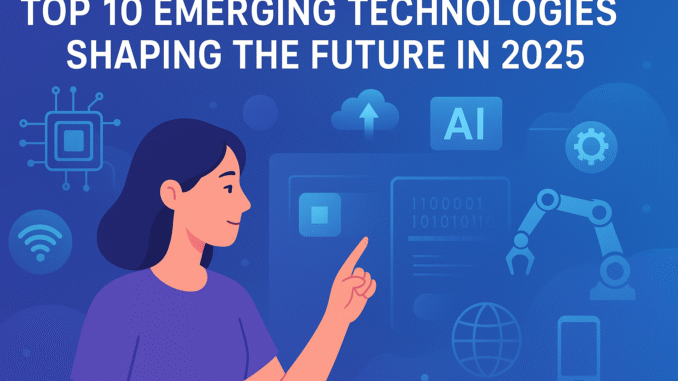
Top 10 Emerging Technologies Shaping the Future in 2025
Technology continues to redefine the way we live, work, and interact with the world. From healthcare to finance, education to entertainment, innovations are reshaping every industry. As we step into 2025, several emerging technologies are poised to have a profound impact on society and the global economy. These technologies not only improve efficiency but also open new opportunities for businesses, governments, and individuals.
In this article, we explore the top 10 emerging technologies shaping the future in 2025, their applications, and the ways they will influence our lives.
1. Artificial Intelligence (AI) and Machine Learning (ML)
Artificial Intelligence has been at the forefront of innovation for years, but by 2025, it is reaching new heights. From chatbots and virtual assistants to advanced predictive analytics, AI and ML are becoming deeply integrated into daily life.
- Applications in 2025:
- Personalized healthcare recommendations.
- Smarter financial planning through AI-driven tools.
- Autonomous systems in transportation and manufacturing.
- Why It Matters: AI improves efficiency, reduces errors, and provides decision-making support across industries. Businesses adopting AI-driven solutions in 2025 will gain a strong competitive edge.
2. 5G and Next-Generation Connectivity
5G networks have already begun rolling out worldwide, but their real potential will shine in 2025. This ultra-fast connectivity will support not only smartphones but also billions of IoT (Internet of Things) devices.
- Applications in 2025:
- Seamless video streaming and virtual meetings.
- Smart cities with connected traffic lights, sensors, and autonomous vehicles.
- High-speed remote surgeries enabled by real-time connections.
- Why It Matters: Enhanced connectivity accelerates digital transformation, improves communication, and powers innovations in smart infrastructure.
3. Extended Reality (XR): AR, VR, and MR
Extended Reality (XR), which includes Augmented Reality (AR), Virtual Reality (VR), and Mixed Reality (MR), is evolving rapidly. By 2025, XR is expected to play a significant role in education, entertainment, and remote collaboration.
- Applications in 2025:
- Virtual classrooms for immersive learning experiences.
- Real estate tours and interior design using AR.
- Gaming and entertainment industries creating hyper-realistic environments.
- Why It Matters: XR blurs the line between physical and digital worlds, enhancing user engagement and creating new possibilities for businesses and consumers.
4. Blockchain and Decentralized Finance (DeFi)
Blockchain is moving beyond cryptocurrencies like Bitcoin. By 2025, it is becoming a foundation for secure, transparent, and decentralized systems.
- Applications in 2025:
- Smart contracts for real estate and legal agreements.
- DeFi platforms offering alternative financial services.
- Supply chain tracking for transparency and authenticity.
- Why It Matters: Blockchain ensures trust in digital transactions, reduces fraud, and opens new opportunities for decentralized applications.
5. Quantum Computing
Quantum computing is often described as the “next frontier” of technology. While still in its early stages, by 2025, quantum computers are expected to solve problems that are impossible for traditional computers.
- Applications in 2025:
- Advanced drug discovery and molecular modeling.
- Optimization of logistics and supply chain operations.
- Cybersecurity solutions with quantum encryption.
- Why It Matters: Quantum computing has the potential to revolutionize industries that rely on complex data, making breakthroughs in science, finance, and medicine possible.
6. Internet of Things (IoT) and Smart Devices
The Internet of Things is expanding rapidly, connecting everyday objects to the internet. By 2025, IoT will play a central role in homes, cities, and industries.
- Applications in 2025:
- Smart homes with energy-efficient appliances.
- Industrial IoT for predictive maintenance in factories.
- Wearables monitoring health in real time.
- Why It Matters: IoT enhances convenience, reduces costs, and enables better decision-making with data-driven insights.
7. Renewable Energy Technologies
As the world pushes toward sustainability, renewable energy innovations are critical. In 2025, solar panels, wind turbines, and energy storage systems are becoming more efficient and affordable.
- Applications in 2025:
- Solar-powered homes and offices.
- Electric vehicles with improved battery life.
- Smart grids managing renewable energy distribution.
- Why It Matters: Renewable energy reduces reliance on fossil fuels, fights climate change, and drives the transition toward a greener economy.
8. Robotics and Automation
Robotics is no longer limited to factory floors. In 2025, intelligent robots are assisting in healthcare, logistics, and even personal tasks.
- Applications in 2025:
- Robots assisting in elderly care and patient rehabilitation.
- Automated delivery systems using drones and robots.
- Industrial robots handling hazardous tasks.
- Why It Matters: Automation boosts efficiency, reduces risks, and supports industries facing labor shortages.
9. Biotechnology and Genetic Engineering
Biotechnology is advancing rapidly, offering groundbreaking solutions in healthcare and agriculture. By 2025, gene editing and synthetic biology are reshaping medicine and food production.
- Applications in 2025:
- CRISPR technology for treating genetic disorders.
- Lab-grown meat reducing environmental impact.
- Personalized medicine tailored to individual DNA.
- Why It Matters: Biotechnology improves health outcomes, supports food security, and contributes to sustainable development.
10. Cybersecurity Innovations
With the rise of digital transformation, cybersecurity is more critical than ever. By 2025, advanced cybersecurity solutions powered by AI and blockchain will protect against increasingly sophisticated cyberattacks.
- Applications in 2025:
- AI-driven systems detecting threats in real time.
- Zero-trust security models for businesses.
- Blockchain ensuring data integrity.
- Why It Matters: Cybersecurity safeguards digital assets, protects privacy, and ensures trust in the digital economy.
Conclusion
As we move through 2025, these top 10 emerging technologies are shaping the future of humanity. From AI and quantum computing to renewable energy and biotechnology, each innovation brings opportunities and challenges. Businesses that adapt quickly will thrive, while individuals who embrace these technologies will find new ways to learn, work, and connect.
The future is not just about technology itself—it’s about how we use it responsibly to build a smarter, safer, and more sustainable world.